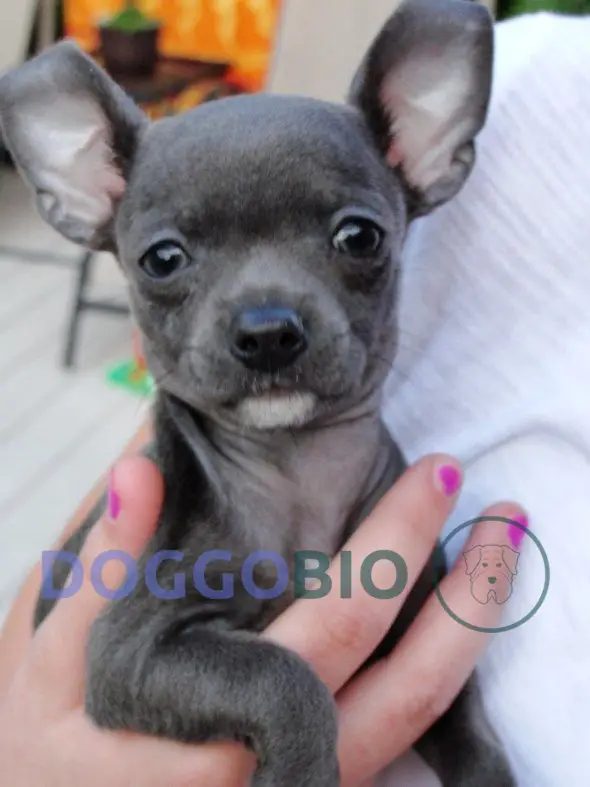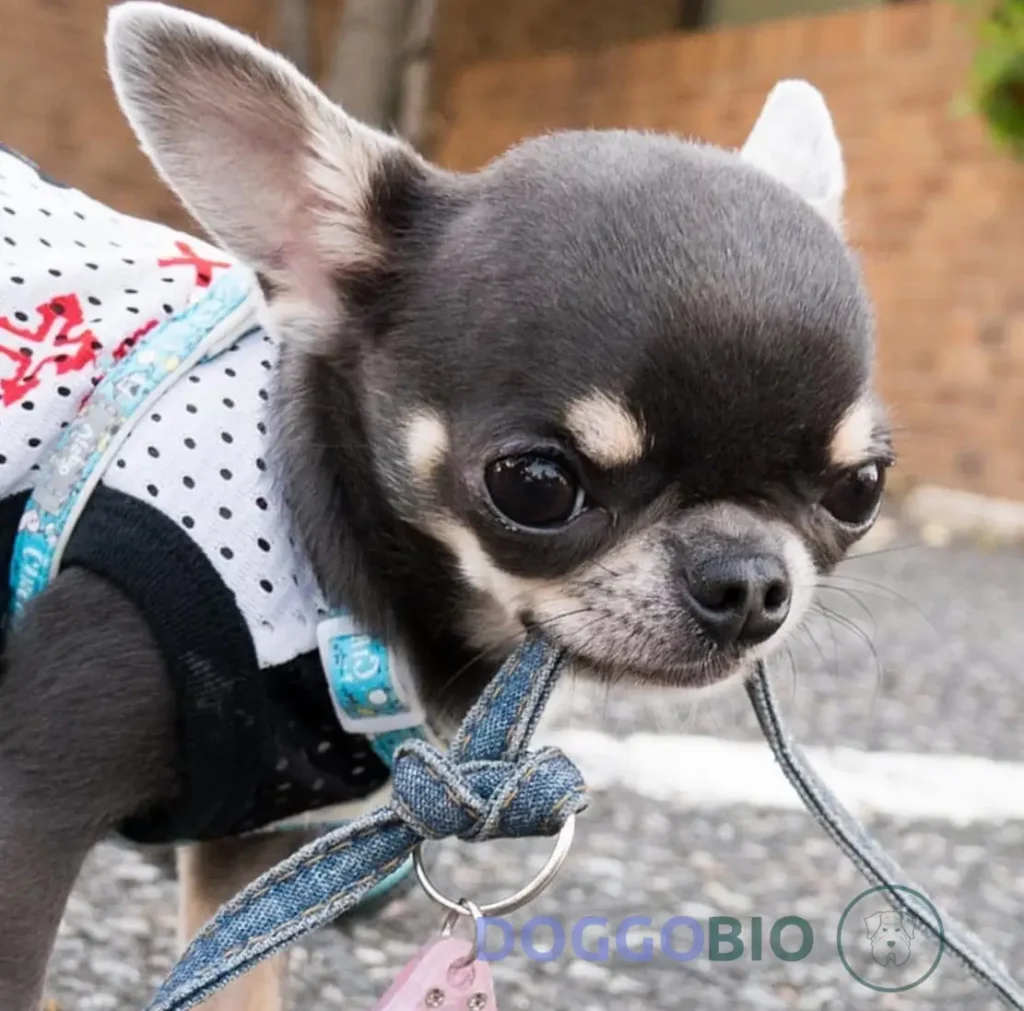Introducing the captivating world of the “Blue Chihuahua” – where whimsy meets elegance, and charm intertwines with uniqueness. Among the tapestry of dog breeds, they stand out as truly remarkable and enchanting creature. With its diminutive size and striking blue coat, this breed captivates hearts and sparks curiosity in all who encounter it.
In this exploration, we delve into the origins, characteristics, and allure of the Blue Chihuahua, uncovering the blend of history, genetics, and personality that make it a cherished companion and a conversation starter.
Brief Overview of Blue Chihuahua
| Rarity | Extremely rare compared to other Chihuahua colors |
| Coat Color | Not actually “blue” in the truest sense, but rather a steel blue or slate color due to dilute black pigmentation |
| Genetics | Requires both parents to carry the recessive blue dilution gene |
| Skin and Features | Nose, paws, eye rims, and lips will also be dark with a blue tint |
| Types | Can be solid blue, blue merle, or blue brindle |
| Temperament | Typical Chihuahua personality: loyal, affectionate, playful, feisty, intelligent |
| Health | No known health problems specifically associated with the blue coat |
| Cost | Due to their rarity, blue Chihuahuas can be significantly more expensive than other colors |
| Considerations | Be wary of unethical breeders who prioritize rarity over health and responsible breeding practices |
What is a Blue Chihuahua?

The term “blue” Chihuahua pertains to the coat color, manifesting as a dark blue-ish black or grey-ish blue shade. This hue might also coexist with other colors like tan or white.
Achieving the blue coat requires the involvement of parents carrying a diluted black gene, classified as a “recessive gene.” The distinctive bluish tinge visible in the dog’s skin can be attributed solely to the presence of this gene.
How do you get a blue Chihuahua?
In the enchanting world of Chihuahua breeding, the emergence of a blue-coated puppy is a rare and delightful occurrence.
When two Chihuahua parents with varied coat colors—tri-color, fawn, or black and tan—come together, the possibility of a blue-hued offspring arises.
It’s the intricate interplay of recessive genes that holds the key. If both parent Chihuahuas carry the elusive recessive blue gene, the litter may be graced with the presence of one or more enchanting Blue Chihuahuas.
This captivating genetic phenomenon unveils the beauty of nature’s surprises, where a puppy’s classification as a Blue Chihuahua transcends the mere colors of its parents’ coats.
Can I mate two blue chihuahuas?
No, mating two blue Chihuahuas is not recommended.
Experienced breeders and veterinarians strongly discourage the breeding of two blue Chihuahuas due to ethical concerns and potential health issues. This gene pairing can lead to various problems, including skin disorders and coat irregularities.
The gene might be overly expressed, resulting in health complications for the offspring. It’s essential to prioritize the well-being of the dogs and consider alternative breeding options to ensure the health and longevity of the Chihuahua breed.
What does a Blue Chihuahua look like?

Size, height, and Weight
They are diminutive in size. However, their specific measurements can vary depending on genetics and overall health.
On average, they typically weigh between 2 to 6 pounds and stand around 5 to 8 inches tall at the shoulder.
Despite their petite stature, they possess a bold and confident demeanor. Their compact size renders them well-suited for apartment living and urban environments.
Nevertheless, it’s important for potential owners to recognize their fragility. Careful supervision is essential to prevent injury, particularly when interacting with larger animals or engaging in play.
Coat colors and Types
While the primary coat color is a shade of blue-grey, they can also have combinations of other colors, including tan, white, and black.
Their coat can be long or short, and some may have merle markings. The variety in coat patterns and colors adds to their appeal, making each Blue Chihuahua unique in its own right.
Regular grooming is essential to maintain the health and shine of their coat. Whether they have a smooth or long coat, routine care ensures they always look their best.
Temperament and Personality
Their temperament is similar to other Chihuahuas. They are lively and alert and often bond closely with their owners. Blue Chihuahuas are known for their spirited and energetic nature. They are fiercely loyal to their families and can be wary of strangers. Their small size doesn’t deter them from being protective, and they won’t hesitate to alert their owners of any perceived threats.
Socialization from a young age is crucial to ensure they are well-adjusted and friendly. With the proper training and social exposure, they can be affectionate companions that get along well with children and other pets.
Training and Exercise Requirements
Blue Chihuahuas require regular exercise and mental stimulation. Training should be consistent and positive. Despite their size, they are energetic and enjoy play sessions and short walks. Mental stimulation can be provided through puzzle toys and training sessions.
Positive reinforcement techniques work best with this breed, as they are eager to please and respond well to rewards. Early socialization and obedience training are crucial to ensure they become well-mannered and friendly adults.
Grooming and Cleaning
- Regular grooming is essential, especially for long-coated. Regular baths, brushing, and nail trims will keep them looking their best.
- Their coat, exceptionally long, can become tangled if not brushed regularly. Owners should use a soft-bristle brush to ensure that their coat remains free of mats and tangles.
- Their ears should also be checked and cleaned regularly to prevent infections. Dental care, including regular brushing, is crucial to maintain oral health.
Food and Diet
A balanced diet is crucial for their health and well-being. Ensuring they receive the proper nutrients for their size and age is essential. High-quality commercial dog food for small breeds is ideal for Chihuahuas.
Owners can also consider home-cooked meals, but consulting with a veterinarian is essential to ensure all nutritional needs are met. Treats should be given in moderation, and care should be taken to ensure they don’t become overweight.
Life Expectancy and Common Health Issues
Blue Chihuahuas, like their traditional counterparts, often enjoy a lengthy companionship with their owners, averaging 14 to 16 years of lifespan.
However, breeding two blue Chihuahuas is strongly discouraged by veterinary experts due to significant health risks associated with the blue coat color. This cautionary approach contributes to the rarity of these unique companions.
Coat color can signal potential health vulnerabilities, with blue Chihuahuas prone to specific issues:

1.Tracheal Collapse:
Labored breathing, coughing, or gagging may indicate tracheal collapse, necessitating immediate veterinary attention to prevent distressing breathing difficulties and seizures.
2.Patellar Luxation (Knee Problems):
Common among Chihuahuas, patellar luxation can affect mobility and require surgical correction, stemming from genetics or excessive stress on the patella.
3.Dry Eyes (Kerato-Conjunctivitis Sicca):
Protruding eyes make Chihuahuas susceptible to dry eyes, particularly in middle-aged or senior stages.
Given their rarity and potential genetic predispositions, Blue Chihuahuas warrant careful monitoring and prompt veterinary intervention for any health concerns.
How much Is a Blue Chihuahua ?
Acquiring a Blue Chihuahua typically involves an investment ranging from $1,500 to $2,000. However, there are instances where the cost can skyrocket to an astonishing $10,000!
This pricing spectrum is contingent on the demand for Blue Chihuahuas and their availability within your region. The probability of encountering a Blue Chihuahua at a shelter nationwide is exceedingly low.
How Can I Find a Blue Chihuahua For Sale?

Consider adoption as your first option to make a life-saving impact.
If opting for a breeder, thorough research on both the breeder and the litter’s parentage is essential. Beware of breeders advertising “rare and blue” Chihuahuas, often priced between $3,000 and $5,000.
Exercise caution with breeders consistently producing “rare blue” Chihuahuas, as this may indicate irresponsible breeding practices and potential health risks for the puppies. Be prepared for potential veterinary expenses associated with health complications.
Is a Blue Chihuahua the Right Dog for You?
While they are captivating, potential owners should consider their lifestyle and the dog’s needs. They require regular care, attention, and training to thrive. Their unique coat color also comes with specific health considerations. Those willing to invest the time and effort will find a loyal and loving companion in a Blue Chihuahua.
Frequently Asked Questions
Is a Blue Chihuahua Aggressive?
No, a Blue Chihuahua is not inherently aggressive.
Their temperament is akin to other Chihuahuas, which can vary but often includes loyalty, affection, and sometimes, assertiveness. However, like any dog, they may display aggression if not properly socialized or if they’re experiencing pain or discomfort. Proper training, socialization, and care can help mitigate any potential aggression issues.
How Long Can a Blue Chihuahua Live?
They have a life expectancy of 14 to 16 years.
Conclusion
In essence, the Blue Chihuahua encapsulates the captivating spectrum of the canine realm. Its enigmatic origins and distinctive blue coat have etched an unforgettable presence in the realm of dog breeds. This petite yet alluring companion exemplifies the beauty of diversity and embodies unwavering loyalty and endearing charm.
As we conclude our journey through the world of the Blue Chihuahua, let’s remember that its legacy is a testament to the profound connections we share with our four-legged friends and a reminder that true companionship knows no bounds of size or color.
